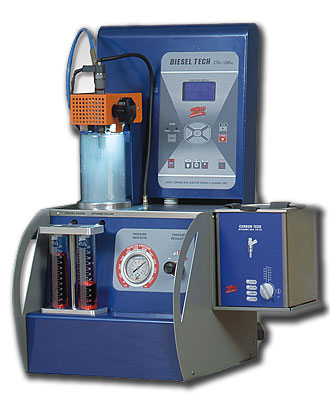
Greek automotive equipment manufacturer, Carbon Zapp International, recently launched its Diesel Tech CTU-1100e – this machine can not only completely test but also clean common-rail diesel injectors or CRDi injectors as well as conventional diesel injectors. This marks a breakthrough in the servicing of CRDi systems as it is a compact unit, which provides a complete testing and thorough (not only the nozzle) cleaning system.
This compact unit “DIESEL TECH CTU-1100e” provides Spray Pattern Diagnosis and Volumetric Measurement (Both sprayed and Back-Leak) as well as the innovative HMACC method (Heated Molecular Activation Chemical Cleaning) and Ultrasonic cleaning. Carbon Zapp has uniquely engineered the HMACC as the only effective method of cleaning all the internal [passageways, nozzle, nozzle seat, back-leak valve and seat] of the Diesel Injectors and not only the nozzle (externally) as all competitors do by using ultrasonics.
Some of the other features of the Diesel Tech CTU-1100e include:
– An illuminated spray test tube with ultra high intensity LED lighting that aids the visibility of the spray pattern.
– Electronically diagnosing and operating all types of Piezo and conventional Coil Diesel Injectors
– Separate testing & cleaning simulation programs, system pre-defined and user programmable.
– Fully programmable (CPU) control panel for future updates.
– Fast injector mount with adaptability to all types of diesel injectors.
– New generation ultrasonic bath.
– Fully automatic or manual use of the menu and all procedures needed to complete a cleaning and testing cycle.
– Injector electrical circuit condition analysis and Ohm testing (dynamic and static test).
– Automatic tube draining among all tests.
– Dynamic engine running conditions simulator. Acceleration/ Deceleration and rich/ lean modes simulator.
– User-programmable sector. Capability for the user to program the injector operating parameters, such as rpm, ms, time, pulses, Opening voltage, opening and holding current, within the testing & cleaning cycles.
– Display menu language selector.
– Injector operating frequency (rpm): 10-16,000 rpm, variable in 10- rpm increments.
– Injector pulse width: 0.01-100 ms in 0.01ms increments.
– Operating time: 5sec – 30min per program.
– Injector pulses: 1-10,000 pulses.
– Dynamic tests performed.
– Digital pressure gauge, for injector High-Pressure.
– Analog pressure gauge.
– Nozzle opening pressure or NOP diagnosing.
– Pressure regulator for adjusting the injector pressure (0-14,500 psi).
– Optimal working conditions at only 8 bar (115 psi) of compressed shop-air.
As more people opt to buy diesel vehicles, Carbon Zapp is concentrating its research and development on common rail technology and high pressure direct injection gasoline engines. In Europe alone, some estimates put the figure of diesel vehicles sold last year at over 50% of total sales of new automobiles. Experts feel that the diesel engine market is increasingly overtaking petrol engines. Especially since diesel engines are becoming increasingly sophisticated. For example, most diesel engines are said to be between 20 to 40% more fuel efficient than their petrol-run counterparts. Similarly, enhancements in diesel engine technology have meant an increase in engine power and torque and lower emissions, and with petroleum prices going up, diesel engines are clearly becoming customer favorites.
So it is not surprising that Carbon Zapp is concentrating on machines that test and clean CRDi and regular diesel injection systems. Carbon Zapp does, however, have competition. Companies like Rabotti, with its TEC200, offer testing and cleaning (only partial cleaning of the nozzle by ultrasonics). The company, which was born in 1926, manufactures test equipment for diesel engines and fuel injection systems. Carbon Zapp, which came into existence in 1989, is a relative new-comer. But from inception, the company concentrated on cleaning internal combustion engines so that they would meet stringent environmental regulations.
Until 1993, the Greek company had a presence mainly in its homeland Greece and Cyprus. However, since 1996, Carbon Zapp has concentrated on increasing its reach globally. Today, the company claims to be the fastest growing fuel injection system equipment brand in the world.
Carbon Zapp went on to develop machines for gasoline fuel injectors using test benches and ultrasonics for cleaning. The company then started manufacturing a hand-held fuel system diagnostic tester. Today, the company claims to be the first in the automotive equipment industry to launch a machine that can test and clean CRDi and conventional diesel injectors.
Carbon Zapp believes its strength lies in being able to concentrate on keeping up with changes in the automotive petroleum and diesel industries. The company has one electronics assembly plant, two manufacturing plants and a final assembly and testing plant. Logistics is handled by at a separate location.
The company is focused on upgrading research and products in the fuel injection repair industry. Carbon Zapp invests over 15% of its operating revenues on R&D. The company has nine employees based in Greece and the United States, who are completely dedicated to R&D efforts. The company also has a number of agreements with component suppliers and manufacturers to help develop technologies and products.
Currently, it is working on beefing up its sales and distribution and gaining a stronger hold in global markets. Carbon Zapp’s sales network extends from Greece and Europe to Asia, Africa, Russia, the Middle East as well as the US. Carbon Zapp believes that its sound financials and strong technology and R&D base, gives it an edge over competition.
Carbon Zapp was started by Bill Pantazis (who is currently the CEO and president of Carbon Zapp) in 1989 in Athens, Greece. While he started with a small network of suppliers and engineers, today he has built up the company to a multi-location manufacturing conglomerate. Automotive Industries spoke to him about how he sees the future of his company and diesel engine technology.
AI: Where does Carbon Zapp’s main competition come from? And how do you tackle it
CZ: Our competition up to today came from equipment manufacturers for cleaning and testing gasoline fuel injectors. These manufacturers are mainly located in England, Australia, and Italy while lately they are also coming from China. Today, by presenting the New Diesel Tech machine, we are getting into the great market of Diesels, where we will face competition from many manufacturers that have started with testing benches 50 or more years ago. Once more, we are not trying to compete with them or their equipment, since we have innovated and manufactured a machine that has no competition yet in the global market. We focus on servicing CRDI injectors and then testing them to verify the cleaning efficiency and injector performance.
AI: Where do you see the bulk of your company’s growth coming from in the next five years? Give us an idea of how big Carbon Zapp will become.
CZ: We believe that major volumes of sales for the next 5 years will be coming from Eastern European countries, Russia, Middle-East and South Africa. All these countries have a lot of potential for growth in this market as they have invested minimal into equipment for emissions control and servicing. Our aim is to create a strong sales network in all the countries mentioned. Our philosophy is not only to grow in more locations worldwide, but to make a strong and respected sales network capable of supporting its market effectively. Within the past 10 years, we have created a name that is based on quality equipment, customer service and support. We do our best to keep it that way and always satisfy our customers.
AI: Your Company is focusing on diesel engine injector technology – why has this happened?
CZ: Today, all major automobile manufacturers have focused on developing their diesel injection system technology to better meet emissions standards, performance and optimum engine efficiency. Since this market is up to increasing vastly, our company has decided to focus on providing the best solution for its customer’s and their needs.
AI: How do you think diesel engine technology will evolve over the next decade?
CZ: We believe that Diesel injector technology will be developing every year in the future. Piezo unit injection technology will be the main focus of most manufacturers as it allows quieter combustion, reduced pollutant emissions, lower fuel consumption, fine fuel atomization resulting in higher thermodynamic efficiency and increased torque per liter. We shall see an increase in operating pressures for the next 10 years and after this period I believe the manufactures will focus on lower pressures, much closer to the concept of Gasoline Direct Injection systems that will reduce the system cost significantly.
AI: Do you see alternative fuels ever posing a challenge to diesel?
CZ: We see alternatives fuel challenging Diesel but not very soon. I believe that we will actually see more of this at least 10 years from today. There are a lot of infrastructure changes that need to be prepared for the industry to change to alternative fuels.
AI: Will Carbon Zapp ever get into manufacturing machines for alternative energy run vehicles?
CZ: We here at Carbon Zapp always strive to manufacture and provide the best possible solutions to our customers and their market needs. Part of our R&D is already researching in this field. When the market needs a machine for servicing newer alternative energy systems, we will innovate once more and provide the appropriate solution to the future service center.









More Stories
Best Wheel Size for Off-Road Adventures: What People Get Wrong
Trusted Auto Collision Repair That Restores Both Performance and Peace of Mind
What You Need to Know About Tire Pressure in Winter vs Summer